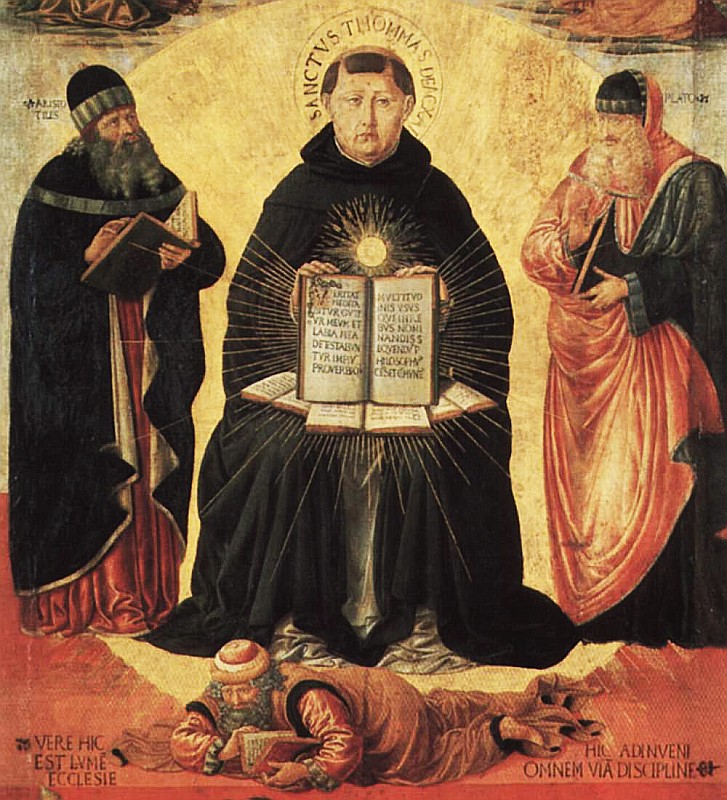Overview and comments on Thomas of Aquinas.
In his work Summa Theologiae(1265–1274) Thomas of Aquinas presents and then proceed to refute two of the common critique for the existence of God. This is the second......
Critique 2:
In order to answer this, he resorts to another favorite method that neatly follows after Occam's razor. He simply increases the level of abstraction. It's not the event of making a porridge that's important it's the idea to make one. Thomas concedes that in an individual framework of a specific event you don't need to bring God as an explanation. He also points out that no matter how much human will and reason or nature can explain events at some point their explanatory power ends. That is where God is. He is the fundamental cause of every process.
For example the concept of survival of the fittest. The question that Thomas would ask is what dictates that the fittest are those to survive? Evolution? OK, but what logic does evolution follow and even if it's random what allows it to be so? Same with contrived effects. You made the porridge because you were hungry, but why were you hungry, etc. By increasing the level of abstraction one question at a time its inevitable to reach a dead end. An initial cause that we can't explain and according to Thomas of Aquinas that's where God is.
What I enjoy about Thomas's refute of the second critique is that by following his logic it's inevitable to make the distinction between nature and contrived effect meaningless. This in term would conflict with the Christian idea that man is somehow different or special compared to animals in the eyes of God. That is, in order to reach the point where God is you inevitably pass through natural explanations. That way although not disproving the existence of God with his answer Thomas of Aquinas covertly critiques the idea that humans are somehow more special than any other being or object for that matter. Mind that I'm not pushing some nihilistic view here. For us, the life of a person would always (for most at least) carry a higher value than that of a wolf the same way that a human carries little value to a wolf in comparison to his own life. What I'm saying is that Thomas of Aquinas's logic refutes the idea that somehow a human would be more valuable to God than a wolf....
Carthago delenda est.....
God is not needed to explain that which can be explained by nature or human will and reason.The second critique is derived by following the logic of Occam's razor. Occam's razor is a favorite paradigm to approaching problems by many scholars. What it boils down to is:
If a few causes fully account for an effect don't seek anymore.This paradigm favorite, especially among philosophy scholars, does present a sizeable challenge to God's existence. Why would one need to involve God in explaining something as benign as making porridge or the existence of the sunflower? A porridge, after all, is created and distributed by and for man. Thomas of Aquinas splits these into two categories: Those that are natural(plants, animals) and those that are contrived by humans(cloths, machines, etc). He answers this critique in the following manner:
“Natural causes act for definite purposes under the direction of some higher cause so that there facts must be referred to God as a first of all causes”-------------------------------------------------------------------------------------------------------------------------
“In the same manner, a contrived effect has to be referred to a higher cause than human understanding and will for these are changeable and cease to be. And all changeable things require a first cause.”Comment:
In order to answer this, he resorts to another favorite method that neatly follows after Occam's razor. He simply increases the level of abstraction. It's not the event of making a porridge that's important it's the idea to make one. Thomas concedes that in an individual framework of a specific event you don't need to bring God as an explanation. He also points out that no matter how much human will and reason or nature can explain events at some point their explanatory power ends. That is where God is. He is the fundamental cause of every process.
For example the concept of survival of the fittest. The question that Thomas would ask is what dictates that the fittest are those to survive? Evolution? OK, but what logic does evolution follow and even if it's random what allows it to be so? Same with contrived effects. You made the porridge because you were hungry, but why were you hungry, etc. By increasing the level of abstraction one question at a time its inevitable to reach a dead end. An initial cause that we can't explain and according to Thomas of Aquinas that's where God is.
What I enjoy about Thomas's refute of the second critique is that by following his logic it's inevitable to make the distinction between nature and contrived effect meaningless. This in term would conflict with the Christian idea that man is somehow different or special compared to animals in the eyes of God. That is, in order to reach the point where God is you inevitably pass through natural explanations. That way although not disproving the existence of God with his answer Thomas of Aquinas covertly critiques the idea that humans are somehow more special than any other being or object for that matter. Mind that I'm not pushing some nihilistic view here. For us, the life of a person would always (for most at least) carry a higher value than that of a wolf the same way that a human carries little value to a wolf in comparison to his own life. What I'm saying is that Thomas of Aquinas's logic refutes the idea that somehow a human would be more valuable to God than a wolf....
Carthago delenda est.....

Няма коментари:
Публикуване на коментар